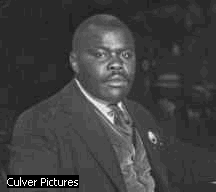

Garvey, Marcus (1887-1940), black nationalist leader, who created a "Back to Africa" movement in the United States. Garvey was born the youngest of 11 children in Saint Ann's Bay, Jamaica. He left school at the age of 14 to serve as a printer's apprentice. A few years later, he took a job at a printing company in Kingston, where in 1907 he led a printers' strike for higher wages. Garvey then traveled to South America and Central America. In 1912 he went to England, where he became interested in African history and culture. He returned to Jamaica in 1914 and shortly thereafter founded the Universal Negro Improvement Association (UNIA) and the African Communities League.
In 1916 Garvey moved to the United States and settled in New York City. There he incorporated the UNIA and started a weekly newspaper, the Negro World. A persuasive orator and author, Garvey urged American blacks to be proud of their race and preached their return to Africa, their ancestral homeland. To this end he founded the Black Star Line in 1919 to provide steamship transportation, and the Negro Factories Corporation to encourage black economic independence. Garvey attracted thousands of supporters and claimed two million members for the UNIA. He suffered a series of economic disasters, however, and in 1922 he was arrested for mail fraud. Garvey served as his own defense attorney at his trial, was convicted, and went to prison in 1925. His sentence was commuted two years later, but he was immediately deported to Jamaica. Unable to resurrect the UNIA or regain his influence, Garvey moved to London, where he died in relative obscurity.